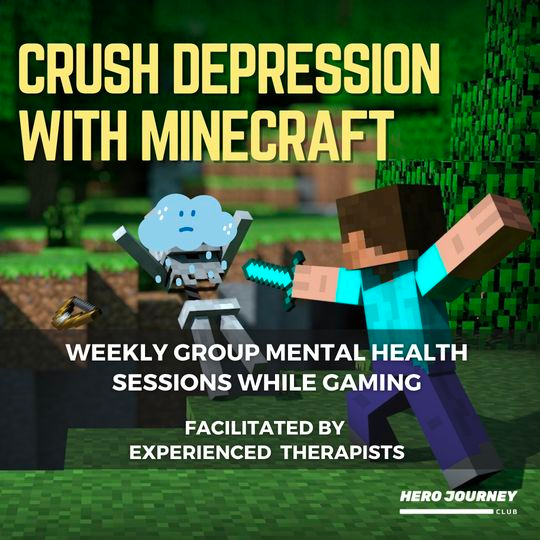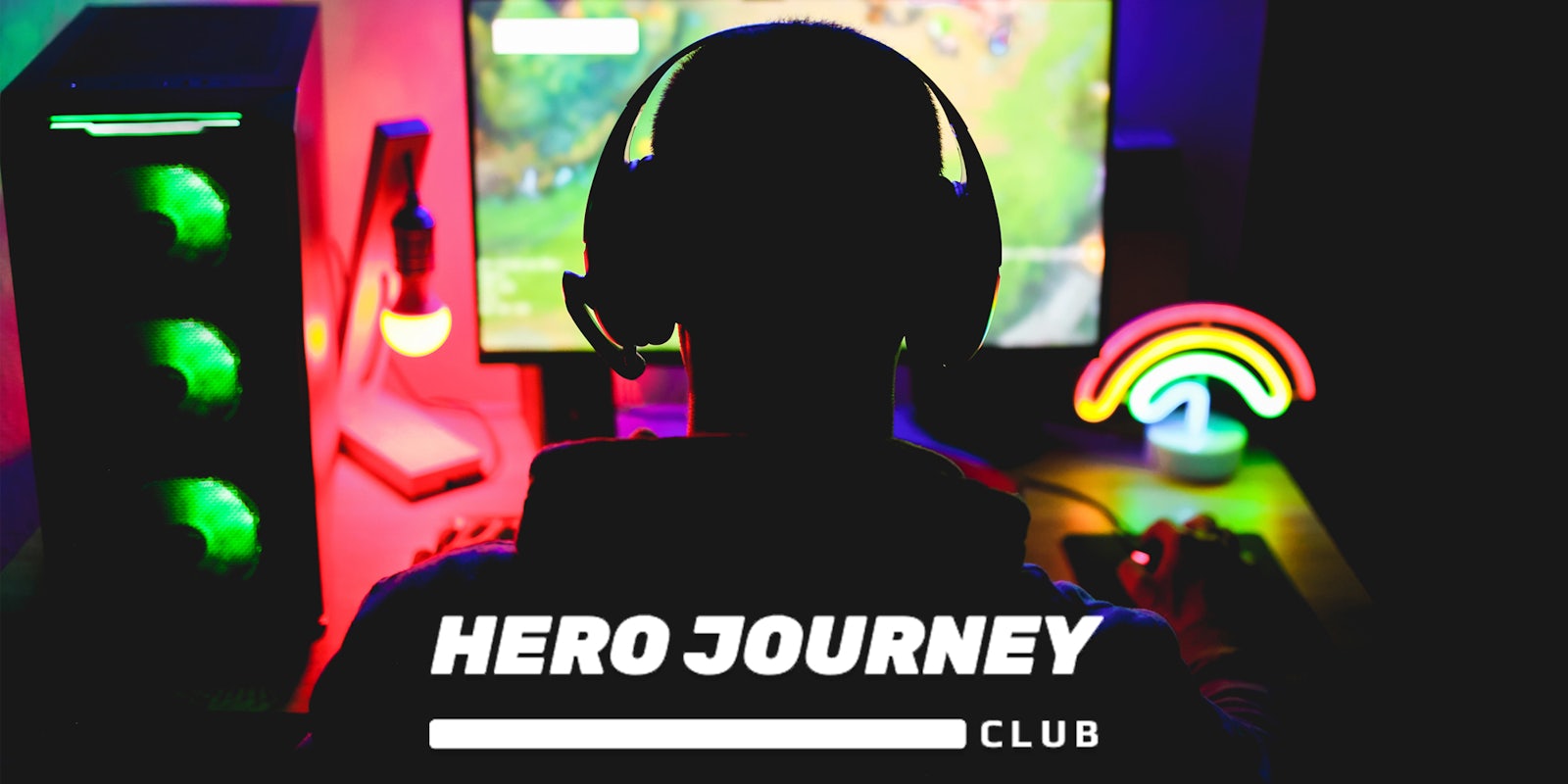Riley was scrolling on Facebook when they came across an ad that said “Crush Depression with Animal Crossing.” They clicked on it and were directed to Hero Journey Club (HJC), a mental health program that runs group sessions with therapists while patients play video games.
Because they had just started playing Animal Crossing and enjoyed its “wholesome community,” HJC interested Riley. They read the program’s website and saw that HJC’s providers are trauma-informed, familiar with addiction recovery, and “a lot of hardcore stuff that other online therapies tend to not be so equipped to handle.”
Riley, who did not share their real name with the Daily Dot, immediately signed up for weekly group sessions.
“The community has genuinely helped me quite a lot,” Riley said. “HJC has been my way to find community with people who can relate.”
Hero Journey Club is a subclinical, telehealth program founded in 2021. It’s aimed at providing mental health care by meeting patients where they’re at: in the world of video games.
The unique approach is the first of its kind in the mental health space—but it begs the question of whether people can benefit from therapeutic discussions while engaged in other activities.
How Hero Journey Club works
When prospective members sign up, they take an intake assessment and then are put in groups of five.
Group sessions happen while participants play video games (either together or separately), and group members tend to be close in age or are going through similar challenges.
Popular group game selections include Stardew Valley, Animal Crossing, and Minecraft, and some HJC members have created exercises and/or worlds in those games based on cognitive behavioral therapy (CBT) and dialectical behavioral therapy (DBT).

HJC’s groups are run by master’s and doctorate-level therapists whom the program calls “Journey Guides,” but the program’s website makes it clear that HJC isn’t a “substitute for psychotherapy or medical advice,” and is simply “an additional tool in the mental health toolbox.”
Journey Guides are responsible for “leading group processes, fostering group cohesion, and creating a safe and productive place for individuals to learn more about themselves and how to address their needs,” per the job’s description.
Most HJC members work with individual therapists in addition to the online program.
For $30 a week, patients get a weekly group session and access to HJC’s Discord community through which patients can privately chat with others in their group or with all of the program’s members.
There are currently over 11,000 people in HJC’s Discord community, ages 18 to 45. Comparatively, similar telehealth services like BetterHelp and TalkSpace each have over 2 million users (though TalkSpace doesn’t offer group therapy).
Riley said that HJC has allowed them to experience some of the most introspective moments they’ve ever had, including their work with their individual therapist.
Because they live with childhood trauma, agoraphobia, paranoia, complex post-traumatic stress disorder, and dissociative disorder (also known as osdd-1b), in-person group therapy was very difficult for them.
“The agoraphobia and social anxiety and pure torture of being perceived face to face is what always made me quit those programs before finishing,” Riley told the Daily Dot. “I’m pretty freaking isolated and scared because the noise inside my own head is chaotic at best.”
They’ve been able to stick with HJC because of its accommodations: Riley can attend group sessions from the comfort of their own home in their pajamas; there is no video component showing their face to other group members; and if they would like to participate by typing into the chat rather than speaking verbally, that’s OK, too.
Plus, they love the Journey Guides that lead their groups.
“The Journey Guides (therapists) are really good at what they do,” Riley said. “They’re all kind, caring, compassionate, empathetic people who actually really care and listen and ask what you need from the group sessions.”
Each group session is 90 minutes long. Riley told the Daily Dot that their group usually starts with an icebreaker activity and then includes a time for each member to check in about how they’re feeling that day. Then, their Journey Guide will lead a discussion about topics that came up in members’ check-ins or something the entire group is focusing on.
Some weeks, group members just use their session as a time to relax.
“We still do check-ins on these days, so we do still talk about stuff,” Riley said. “But it’s more relaxed and the focus is more on having fun and just vibing.”
Group members can also stay completely anonymous; they don’t have to share their names or any identifying information with their fellow group members.
The pros and cons
HJC isn’t perfect. Riley told the Daily Dot that the biggest downside is the high turnover rate. Coming into a group that has already established a dynamic and is comfortable sharing with each other can be intimidating for new members.
But playing games together serves as a buffer for any awkwardness or first-day jitters.
As for how members choose which games they play, Riley said everyone can do their own thing, like play a different video game than other members. Riley chooses to do art therapy prompts during their group sessions.
But no matter what group members do during sessions, the community that HJC creates seems to be what brings members together.
The aspect of community is one of the main tenets of group therapy, Andrew Bordt, the executive director of the Institute for the Advancement of Group Therapy, told the Daily Dot.
Group therapy is different from individual therapy because participants can foster empathy, camaraderie, and stronger communication skills just by interacting with their fellow group members.
Plus, the validation that group members receive from each other makes being vulnerable and sharing one’s emotions in the group a less daunting experience.
Regarding HJC, Bordt thinks it has created an innovative solution to making therapy appeal to populations that may have struggled with getting adequate mental health care in the past, like those who don’t feel comfortable doing traditional face-to-face (or cameras-on Zoom) group therapy.
“To get people in the door, going with something that everyone already likes,” such as playing video games, “is a good call,” Bordt told the Daily Dot.
Still, when he looked into HJC’s model, he had a couple of qualms: Because the conscious mind cannot actually do two things at once, Bordt says playing a game while simultaneously engaging in group therapy is not possible.
“If you’re not actively engaging [all] the patients in the room, then they will zone out,” Bordt said. “How do you really get everybody engaged at the same time and talking?”
The Daily Dot posed that question to HJC founder Brian Chhor. His answer? Sometimes, zoning out is OK.
“We try not to judge the process or impact as long as [patients] come away feeling better,” Chhor told the Daily Dot.
He also stresses that some people, particularly those who are neurodivergent, feel they can focus better when their hands are busy. So for them, playing while in a group session benefits their participation.
Chhor also told the Daily Dot that “about a third” of the HJC community identifies as neurodivergent; a third also identify as queer. Both populations can use gaming as a way to better express themselves.
Chhor said autistic HJC members created a Dungeons & Dragons game to communicate their lived experiences to non-autistic people, and previous reporting from the Daily Dot has also shown that queer people use gaming as a way to explore their gender and sexuality.
The ‘SoulCycle’ of mental health
HJC group sessions don’t have to be intense or even effective each time someone attends; it’s more about consistency and the feeling of belonging that group members experience. Chhor thinks Hero Journey Club is to mental health what SoulCycle is to fitness: a place where people engage with a community of others who have the same goals.
Plus, Chhor is no stranger to the healing power of video games: He grew up playing them to cope with stress.
“Video games were almost like a babysitter for us,” Chhor told the Daily Dot. “Initially as a refuge for us to survive middle school, but then, over time, also helped cope with more intense stress.”
Chhor got the idea for HJC after one of his cousins struggled with suicidal ideation during the pandemic. To better support him, Chhor’s brother set up a Discord server where family members could all talk to each other and keep an eye on their cousin.
Seeing the discussions his family members had not only with his cousin but also with each other made Chhor realize that depression and loneliness are things many people face—and that therapeutic discussions can happen outside traditional therapy settings.

“Could we take therapy out of the clinic, and into the communities where people already spend their time?” Chhor says he asked himself. “And then can community be the first step towards healing for people who are otherwise intimidated by what that means?”
HJC has been able to build its community, in part, because the cost of weekly groups is so low: Each group member contributes to the overall rate for the Journey Guide that works with their group.
‘Stardew Valley’ and beyond
Cole Mederios, the head of operations and business development at ConcernedApe, the developer of Stardew Valley, wasn’t surprised to hear that the game was being utilized by HJC in a therapy context.
In the game, players care for a farm and can “learn to live off the land.”
“Stardew Valley is about connection,” Mederios said. “And there is an element to it, that’s sort of like meditative.”
Players can connect with other villagers, express themselves in how they decorate their farm, and generally focus on whatever is most exciting for them within the world of the game.
“There’s a lot of potential for video games to be very helpful for mental health or to help people learn or process ideas,” Mederios told the Daily Dot. “It’s neat to see Stardew Valley being used in that way.”
It’s the meditative quality of HJC group sessions that has helped Riley the most.
“While the others are talking I doodle and do my lil drawings,” they told the Daily Dot. “Man, if I don’t get my weekly coloring sessions I don’t feel right!”
But it’s more than that. HJC has been nothing short of life-changing.
“It’s literally the only time in my life,” Riley said, “that I am actually motivated to do something other than dissociate 24/7.”



